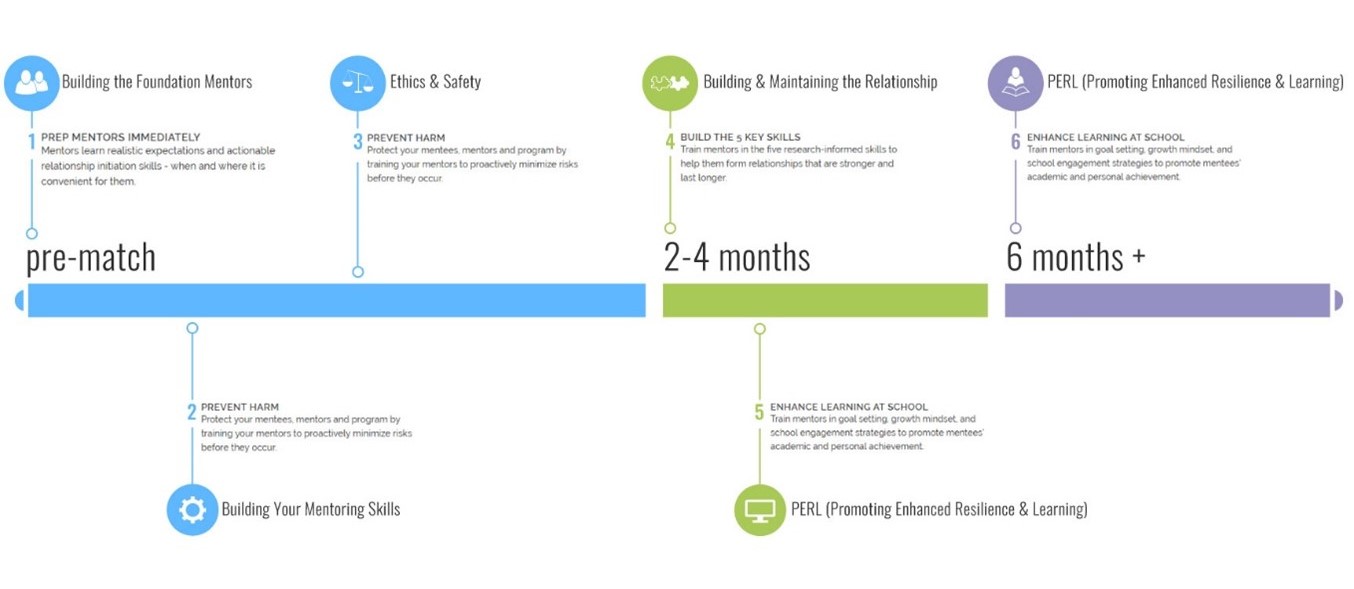Posted by jmeyer on July 27, 2022
The foundation for engaging volunteers to be impactful mentors is an evidence-based, interactive training program. The ultimate goal is that the mentoring relationship will affect, in some way, the course of the lives of mentees. It is a rewarding experience, and it is made safer and more effective with training that builds self-efficacy.

The Elements of Effective Practice for Mentoring describes five key elements that are necessary for effective mentor training. They are:
Each of these five aspects of training is explained below. The Elements of Effective Practice for Mentoring is a free resource that is essential reading for programs thinking of starting a new or enhancing an existing mentoring program.
Mentors should receive a minimum of two hours of pre-match training with a preference for six hours of training. Training may be most efficient and effective when a blended learning approach is used, which integrates online education with instructor-led discussions, either in-person or using an online meeting platform. Training and orientation should also involve the mentee and parents or guardians to ensure everyone knows what to expect from the relationship and mentoring program.
Pre-match mentor training that takes place before the mentor has met their mentee ensures that your mentors have the necessary skills to build effective relationships with their mentees. It is also critical that before matching, mentors are familiar with the program policies and know how to identify any issues about which they may need assistance.
As training progresses, mentors will become more confident in their roles and will start preparing for the mentoring relationship. They will learn the program requirements, share their goals in being a mentor, and understand what their appropriate roles are in the relationship. Safety and ethical issues will be discussed, as will the general structure for the frequency and duration of visits.
Pre-match training gives program staff the opportunity to notice the mentor’s strengths and any areas where they could use some additional resources or tailored training to increase their self-efficacy as a mentor. A good mentor training program will be effective at covering key fundamentals of mentoring while allowing for one-on-one time for the mentor with program staff.
Once matched, the mentor is embarking on a relationship that has the potential to change someone’s life. To ensure the relationship continues to move forward in a positive and impactful way, post-match training is a good follow-up to basic training after the mentor has had some experience in their mentoring role. Inevitably, questions arise once the relationship has started that were not foreseen by the mentor during the pre-match training or contemplation phase.
Post-match training can also help when complex issues arise or when additional factors are impacting the mentor-mentee relationship, such as when the mentee experiences a significant life event.
The content of your pre-match mentor training course is dependent, in part, upon the goals of your mentoring program. For example, are you focused on providing mentors to children impacted by criminal justice issues? Or are your mentees primarily from a specific demographic population (e.g., defined by their age, sex, race)?
Regardless of the goals of your mentoring program, a relationship is at the heart of mentoring, and there are some topics that have been identified as key to supporting the development of an effective and enduring mentoring relationship, such as training on positive and realistic expectations, the appropriate roles of mentors, and common boundary issues in mentoring relationships.
To offer the most helpful content for training mentors, we refer you to these resources:
Mentors rely on having supportive materials available to complement their in-person or blended approach to training. Feedback forms, resources for specific topics, and direction on handling challenging situations will build an effective mentor for your program.
If you choose to compile your own resources, ensure they are either evidence-based or research- and practitioner-informed. This means that the resources are supported by research literature, which you can easily reference. We cannot stress enough the importance of using resources that have been critiqued by experts in the field. In other words, the results from using resources that are not evidence-based will be less likely to be replicable or impactful.
You can also supplement your resources with those provided by Mentoring Central. Our resources have been created based on input from research and practitioners, and they will greatly benefit your program.
Embarking on creating a mentor training course is a dedicated undertaking for any program. You are connecting an older adult who has something to offer with a young person who may not have had a history of positive relationships with others. Doing that safely and effectively for a long-term and positive outcome requires a strong foundation. Your program can be a community leader, and Mentoring Central can help.
Mentoring Central is a multidisciplinary team of scientists, educators, and mentoring practitioners. They use scientific research and real-world perspectives to build products and services that are both effective and practical. They are funded by federal research grants to further their knowledge and build readily adopted, scalable, and effective tools for the field while making their findings and training programs accessible.
The Mentoring Central team is a leader in the mentoring field, and their evidence-based mentoring training courses are easily purchased and accessed by your program. These trainings are every mentoring programs’ greatest resource.